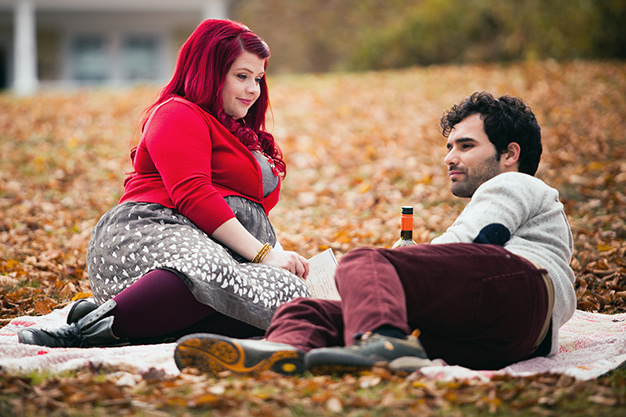By: Addison Wylie
I can easily sell you on Relative Happiness by describing Melissa Bergland’s dynamite performance. She’s spunky and wise, manages an adorable Bed and Breakfast in Nova Scotia, and her sense of humour is quick-witted towards those who condescend her. She takes the audience’s attention and commands the screen.
I wish it was that easy to describe Deanne Foley’s lukewarm dramedy. Mostly because of a deceptive bait-and-switch at the halfway hump which converts the Canadian indie’s perkiness into solemn melodrama. It appears Foley has been misinformed by someone – maybe one of her producers – that a filmmaker can’t incorporate tragedy without resorting to such soppy dramatics. That, or her screenplay (to which she helped co-write with three other contributors) can’t handle the change in tone.
The film’s first half works enormously better than when the stakes are raised. We’re quickly introduced to Lexie Ivy (Bergland) and her helicoptering, concerned family as Lexie’s sister Gabby’s wedding approaches (Gabby is played by Hobo with a Shotgun’s Molly Dunsworth). Each performer does a commendable job at maintaining their own role while working in their active ensemble. Although, my heart sank whenever Aaron Poole entered a scene. His dopey Notherner nice guy schtick is perhaps laid on too thick. He’s portrayed as too much of a dopey goofball, and he always comes across as a character putting on an act. An example: I didn’t even believe the hair on his head until I saw him without his ball cap.
Movie goers get a great feel for the calming vibe Relative Happiness will seemingly embrace. It’s a safe way to deliver a movie (especially when we’ve seen Canadian indies take this road before to please an undemanding crowd), but Foley and her cast can at least execute it well. I also appreciated how Relative Happiness looked for other ways to get a laugh instead of sinking to a shallow level. Granted, a lot of jokes towards the beginning are based around Lexie’s voluptuous presence, but the film is smart enough to look elsewhere for humour in life.
Once that second half kicks in, it feels as if Foley is trying to claim herself as Canada’s answer to Tyler Perry. It’s admirable to see the acting ensemble treat the material with respect, but the lighthearted situations were much more watchable compared to the ham-fisted heaviness surrounding themes of infidelity. I don’t mind when a movie gets serious, but it’s hard for Relative Happiness to make this tight u-turn since the movie sets itself up for a quirky, fluffy rom-com.
When I saw Son of the Sunshine, I tried to coin “maple syrup melodrama”. It was a term to describe the ongoing motions some Canadian filmmakers seem to be following through with. It may have been a facetious and stereotypical term (Son of the Sunshine’s filmmaker Ryan Ward actually called me out on it after my review dropped), but it was invented out of exhaustion. As a viewer, I don’t like being dampened by unnecessary drama. Filmmakers need to know there are other ways to add plots and risks.
Before Relative Happiness takes this burdensome reroute, much of the movie resembles an episode of Girls conceived by your Nana’s polite bridge club. I would’ve been okay if the whole movie had been this way. Relative Happiness would have been soft and predictable, but it would have been less complicated.





Leave a comment